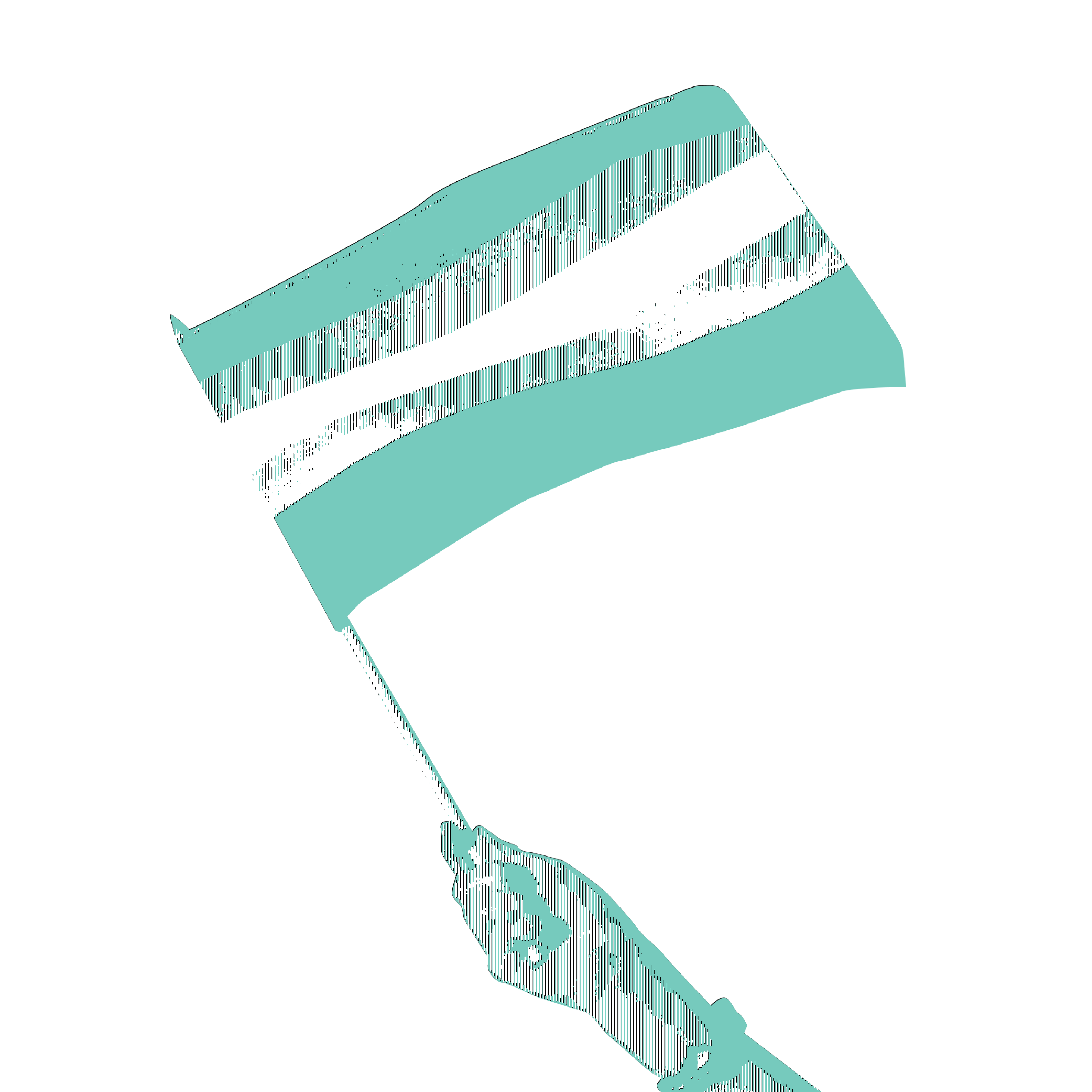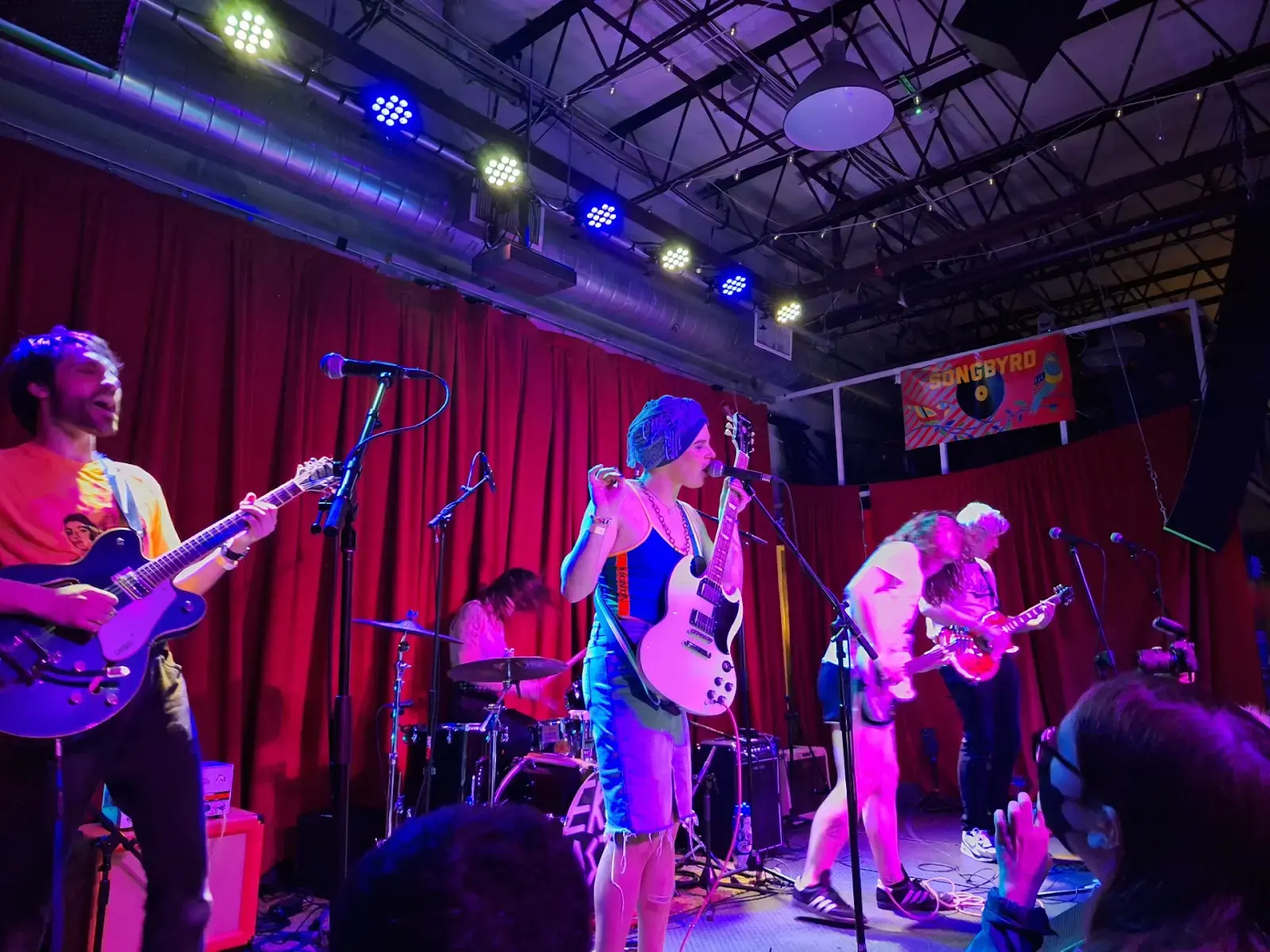
An SUV jets up Interstate 70 heading north of D.C., its wake transforming an oncoming string of green mile markers into side-view mirror radioactive trail dust.
Sandwiched between a sticker-speckled dashboard and a rear window brimming with overnight bags, the car’s passengers have settled into the comfortable familiarity of a four-hour road trip, plushies and hoodies transforming cramped to cozy.

As a nonprofit journalism organization, we depend on your support to fund more than 170 reporting projects every year on critical global and local issues. Donate any amount today to become a Pulitzer Center Champion and receive exclusive benefits!
But the energy in the car is far from sleepy—rather, the cabin crackles with animated dialogue, as members of D.C. and New York bands Ekko Astral and Crush Fund discuss the perpetuation of misinformation about the transgender community in the mainstream media. Rising stars in the East Coast underground punk scene, the two bands feature mostly trans women in their lineups, lending them a unique perspective on the climate of trans rights in America today.
“People don’t think about how they were first exposed to trans people on the internet, right? There were resources online that were created by anti-trans activists to get people to literally not believe that trans people exist. Like, this is a concerted effort online. And there are those websites out there that are attacking people left and right. You wind up in this space where even saying what the truth is is pretty dangerous. And it’s just so hard to educate people,” Jael Holzman, the frontwoman of Ekko Astral explains.
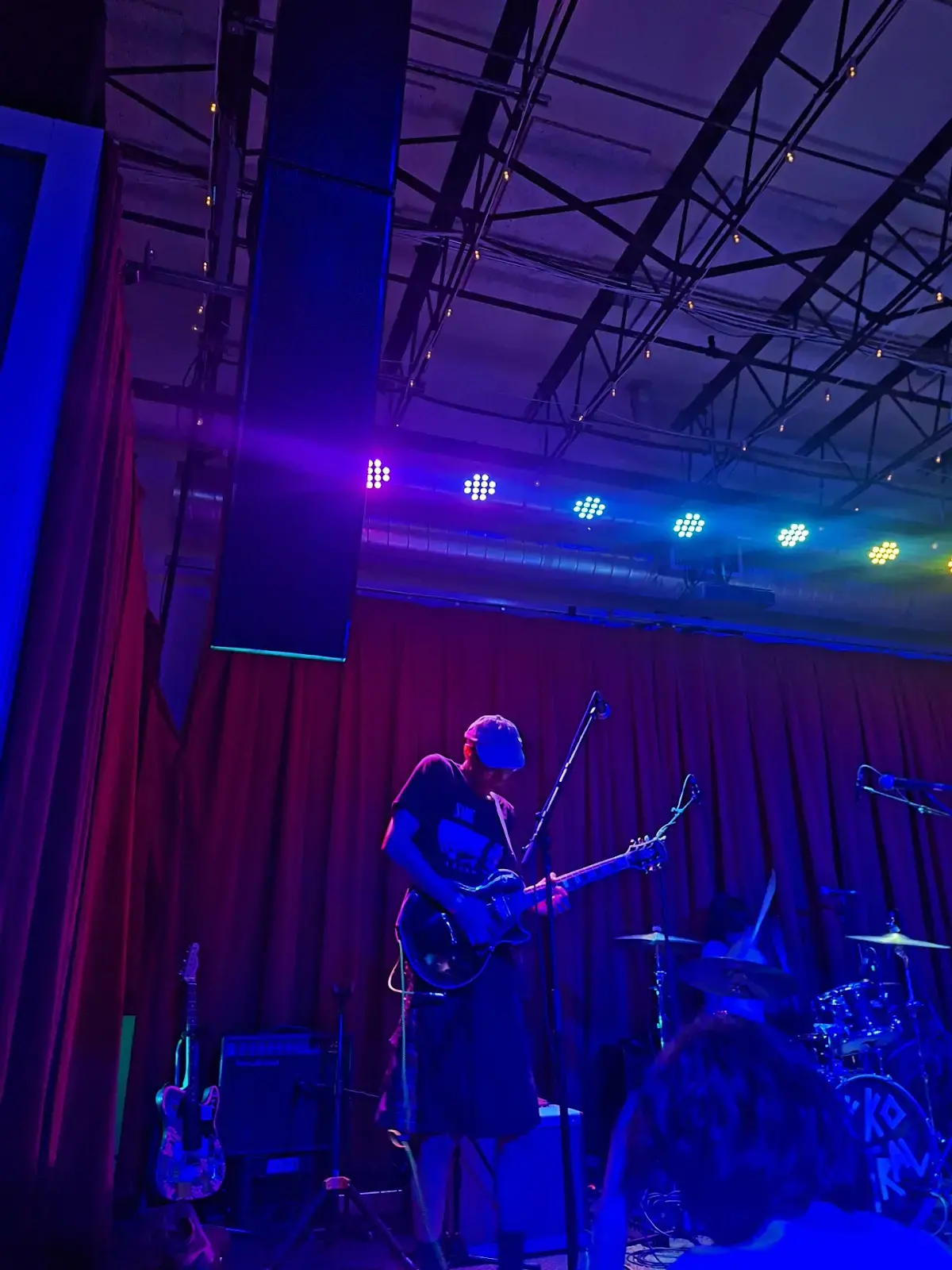
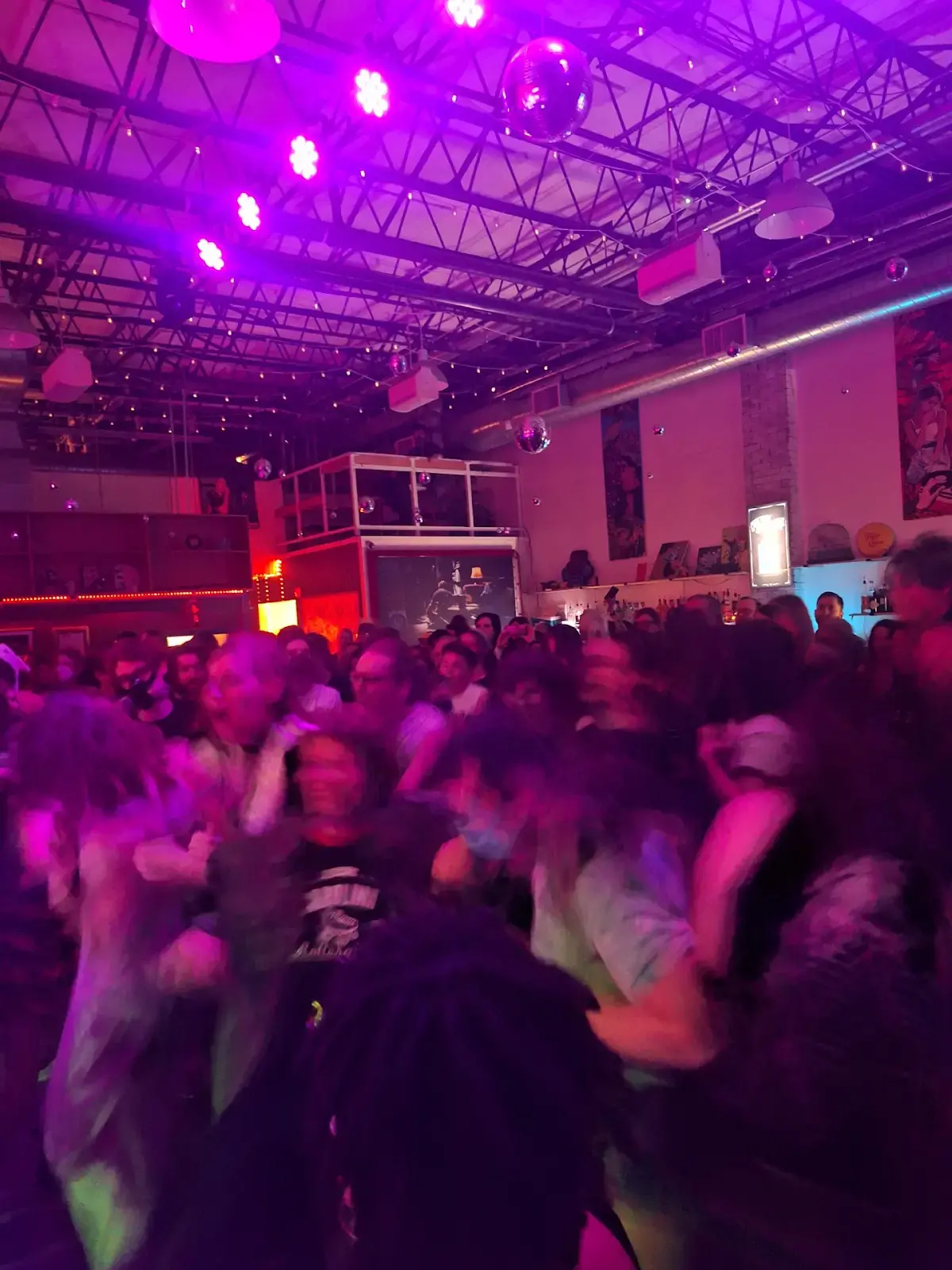
Leaning against the side window to face the rest of the car, her voice vibrates with the urgency of her statement. Eyes alight, in a newspaper print jacket and mauve head scarf, she pops with the vivacity of relighting birthday cake candles.
The issue she’s touching on is the real-life harm of the lack of proper transgender education and representation in the mainstream media. With increasing hate-crime rates and a barrage of anti-transgender legislation sweeping the nation, the United States is facing an epidemic of death in the LGBTQ+ community so urgent that the Human Rights Campaign Foundation declared a state of emergency for the first time in over 40 years.
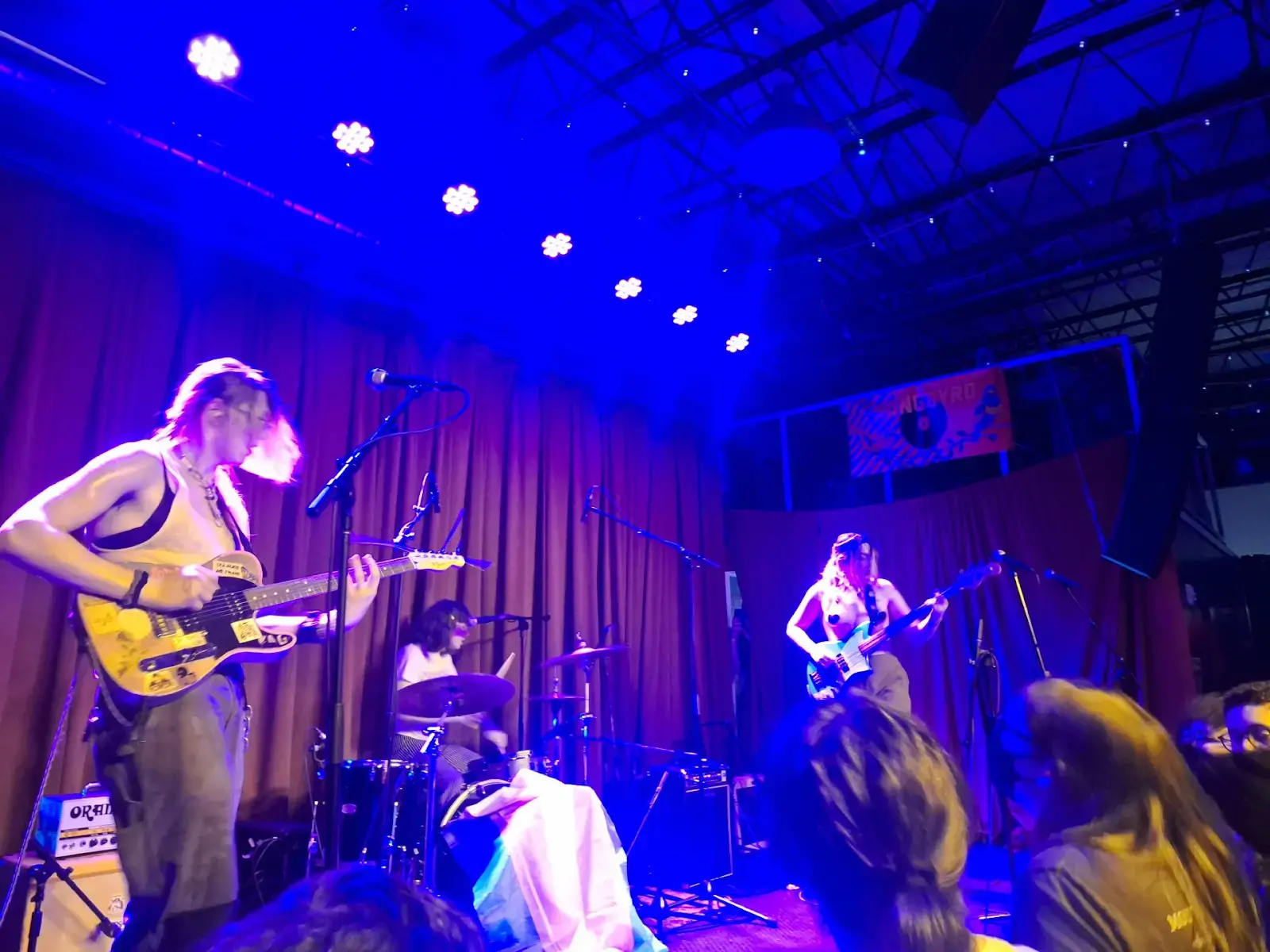
With every headline reporting the tragic death of a trans or nonbinary person, the direness of the situation increases.
Whether it be in the liberation of euphoric gender expression, or the normalization of transgender identity to an otherwise uninformed concertgoer, trans artists are bringing rejuvenation and representation to the post-hardcore punk and shoegaze scenes.
The conversation in the car continues up Interstate 70, jumping from poignant critiques of capitalism to “crap or not crap” games, until the clustered Breezewood, Pennsylvania, intersection creeps across the windows. Cramped with gas stations, behemoth highway signs, and boarded-up motels, the intersection of Pennsylvania’s Turnpike and I-70 is the festering heart of modern America.
Enthralled by the gothic decay around them and excited to be visiting the “meme city,” the band members jump at the chance to stop for an impromptu photo shoot.
Against the grim backdrop and overcast sky, the women of Crush Fund and Ekko Astral are riots of color. Next to Jael Holzman's mauve is Crush Fund’s Wendy Kya and her orange cream soda hair, soft like a sunset fading pink. Together, they splash yellow neon across bleached asphalt—Miriam Tyler’s beanie, July Brown’s hair, and Nora Knox’s shirt. Star patterns and newspaper clippings, chokers and piercings; they are vibrancy against a world in grayscale.
Brightness out of grimness, just like their music.

The underground punk scene is bursting at the seams with trans artists, each one creating a new, colorful combination of sounds and concepts to transcend alt-rock genres.
For every band like D.C.’s Pinky Lemon, who concoct pink-bubble potions of punk, electronic, and dreamy surf-rock, there’s a solo artist like Minneapolis’ Anita Velveeta, jamming shoegaze, nightcore, emo and post-hardcore influences into a wicked whiplash of noise. Brooklyn’s Crush Fund makes roaring punk jams that rattle bones and revive veins, set to intense lyrics and a bombastic bass.
Contrastingly, Ekko Astral’s five-piece lineup makes watercolors supersonic and guitar riffs visible in ultraviolet—all wrapped up in a classic punk sound reminiscent of the Riot Grrrl movement, or as they’ve coined it, “Moscara Moshpit.”
Just as each artist approaches the chemical makeup of their sound differently, so, too, do they vary in their perspective of lyric writing and their potential political weight.
“We’re three trans girls just putting everything out there,” Knox, drummer and lyricist for Crush Fund, explained. “We’re not doing it because we’re trans—we’re connected because we’re trans, for sure, but I think on a songwriting level … I’m writing about what animates me … I’m trying to pull from places that motivate me, and seeing scary s--- happen to me and trans people around me is definitely really, really motivating."
"... A lot of the times it comes from an emotional place, it comes from a place of heartbreak, it comes from a place of frustration,” Knox said. “If people think we’re a political band, it’s because those real-life concerns—what is firing me up—is injustice.”
Each band approaches political protest from a unique angle, ranging from the upfront expression of Crush Fund, to Pinky Lemon’s testament that not directly writing about transgender identity, and making music for the sake of its own enjoyment, is in itself a form of protest.
Holzman provided another view, attesting, “We write about subjects that are politicized … we write about real-life struggles. It’s not about, necessarily, ‘This is a song about political cause;’ that’s not what we—at least us—we don’t see that as our prime objective.”
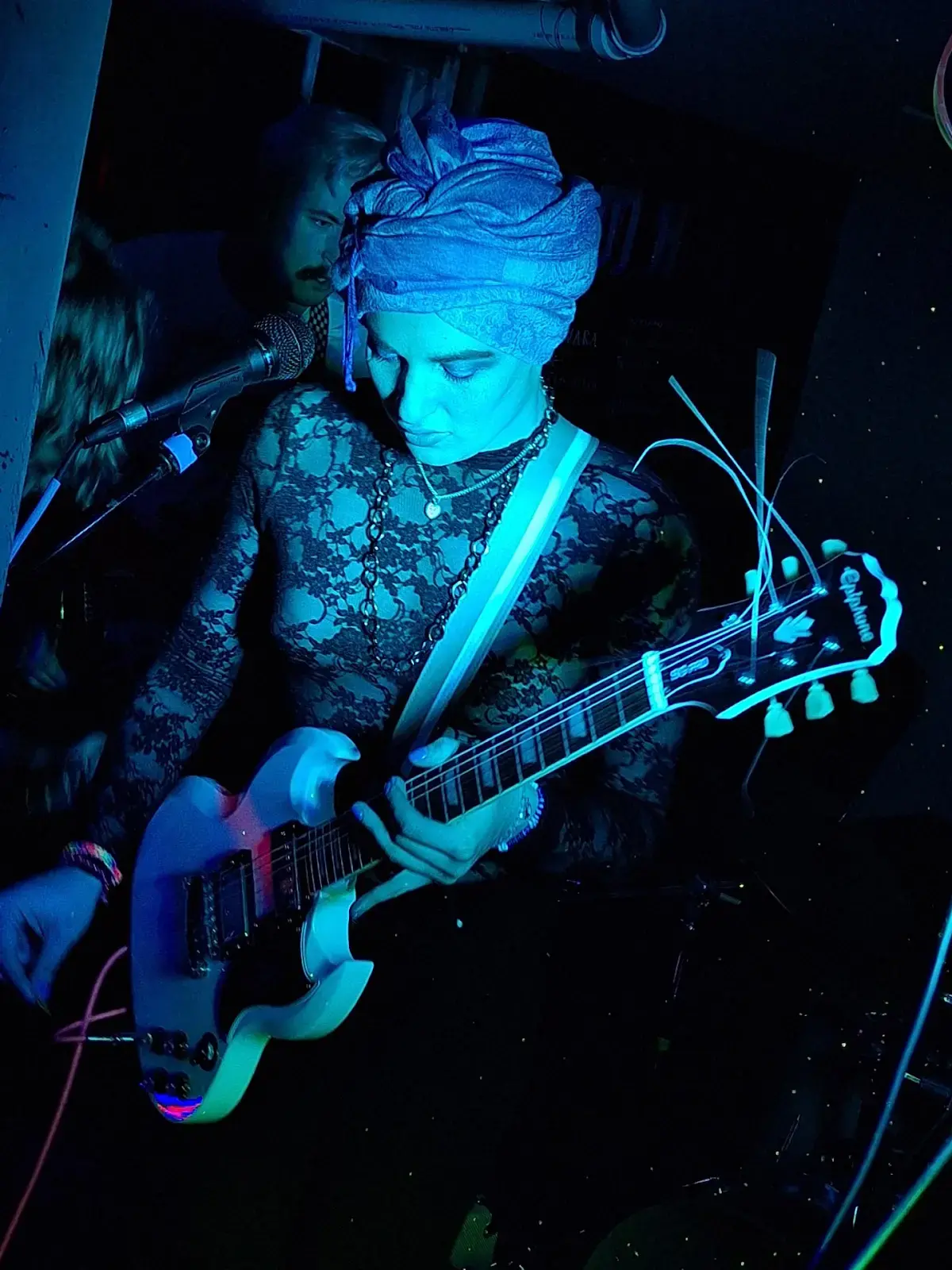
Rather than purposeful political messaging, Ekko Astral’s main focus revolves around the importance of the individual, their music touching on the trans experience without diving into any potentially controversial statements.
This is not to say that these bands’ differing opinions operate independently, but rather they provide balance within a varied scene, leading to a wealth of shared inspiration. Every band member is passionate about upholding their community however they can, either in supporting other musicians or other trans people in need.
During the January 26 show at D.C.’s Songbyrd Music House, Spring Silver’s K Nkanza announced the night’s raffle of a painting signed by all members of the lineup, the proceeds of which would contribute to helping trans kids encountering a health care crisis in Ohio.
When questioned about her influences, Anita Velveeta referenced Holzman’s performances as a catalyst to record her raw voice instead of pitching it higher, and between sister bands Crush Fund and Ekko Astral, there’s even a bit of a playful rivalry.
“It was really cool to get to know Crush Fund and see them just all take their shirts off,” Guinevere Tully, Ekko Astral’s bassist, commented on the difference of going shirtless onstage post-transition.
“I was like yeah, you’re right, I can still do that and have fun with it … It’s nice, especially when it gets hot and sweaty. It feels more like the normalization of the body. I saw July take her shirt off at Songbyrd and was like, ‘Do I kind of want to one-up her?’”
Though they have a wide contrast in creative choices, all of the underground artists have a deep, intense love for music of all genres. Music hums in their veins, comprises their essence.
Onstage, their pure enthusiasm for music shines through—whether it be the frenetic, burning energy of Crush Fund, as Kya jumps off the drum kit and July Brown rips off her top and dives into the center of the pit with her bass, or the cathartic climax of an Ekko Astral song, each member lost in symphonic joy. No matter the size of their venue, from small basement shows to sold-out D.C. venues, the level of love they bring to performing is palpable, intoxicating.
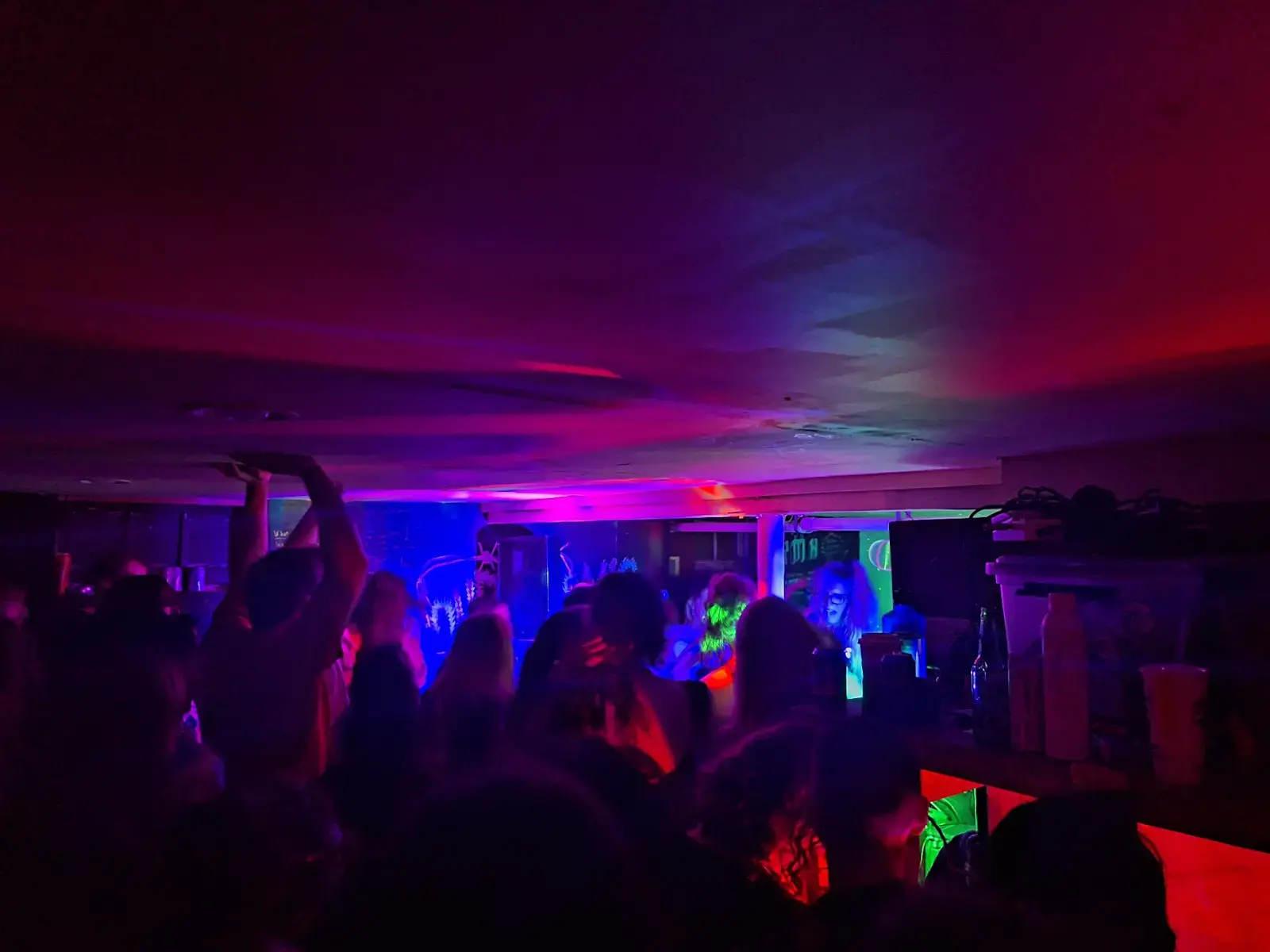
After their pit stop in Breezewood, the rest of the car ride passes in a haze, as the band members save their energy for the upcoming show. When they finally arrive at the local venue, an old house nestled on the edges of the Penn State campus, bitter cold rain drizzles from the sky—but does not dampen their spirits, or those of the partygoers.
Stuffed to the brim with college students, the house hosts each set in a tiny basement, amp cords spidering along the floor, and the ceiling close enough to touch. But the small size of the venue, compared to the 250-max capacity of the Songbyrd Music House the night before, only excites the band members more.
“Truthfully, getting to play those smaller, more intimate spots is always going to hold a really special place in my heart,” said Tully, who was immediately backed up by rhythm guitarist Sam Elmore.
“I like DIY venues and house shows because it’s all community-run. It’s put on by the people who are there to see you, and who really want to make it happen,” Elmore said. “It’s by fans for fans, which is just really nice. It creates a really good atmosphere ... a special kind of care.”
Like fizz bursting out of a cherry coke, the atmosphere of the venue is uncontainable, as college students bounce like electrons: singing and dancing unabashedly. Though this show is small, it is not insignificant. In between each set, the college kids devotedly brave the cold sleet outside and mingle with the band members, creating lasting memories and connections.
During Crush Fund’s set, they respond with screams of joy to Kya’s call to any queer members of the audience, and celebrate those around them. In this sleepy Pennsylvania town, Crush Fund and Ekko Astral display their pure power: giving young hopefuls a chance to see, to be, to embrace themselves.
Due to the rising stigma around the transgender community, it is difficult for many trans people to be completely guaranteed safety in any given space. But that is not the case for those who attend Ekko Astral or Crush Fund shows. During each set, the audience is reminded to be there for one another, to pick each other up if they fall down in the mosh pit.
“It goes back to the ethics of punk,” said Miriam Tyler, “and the fact that it’s a community before it’s a genre.”
“We managed to cultivate this really nice way to have a lot of trans people all get to come meet up and feel safe and secure in an area … just having a really safe outing where you don’t necessarily need to drink or anything,” Tully said later.
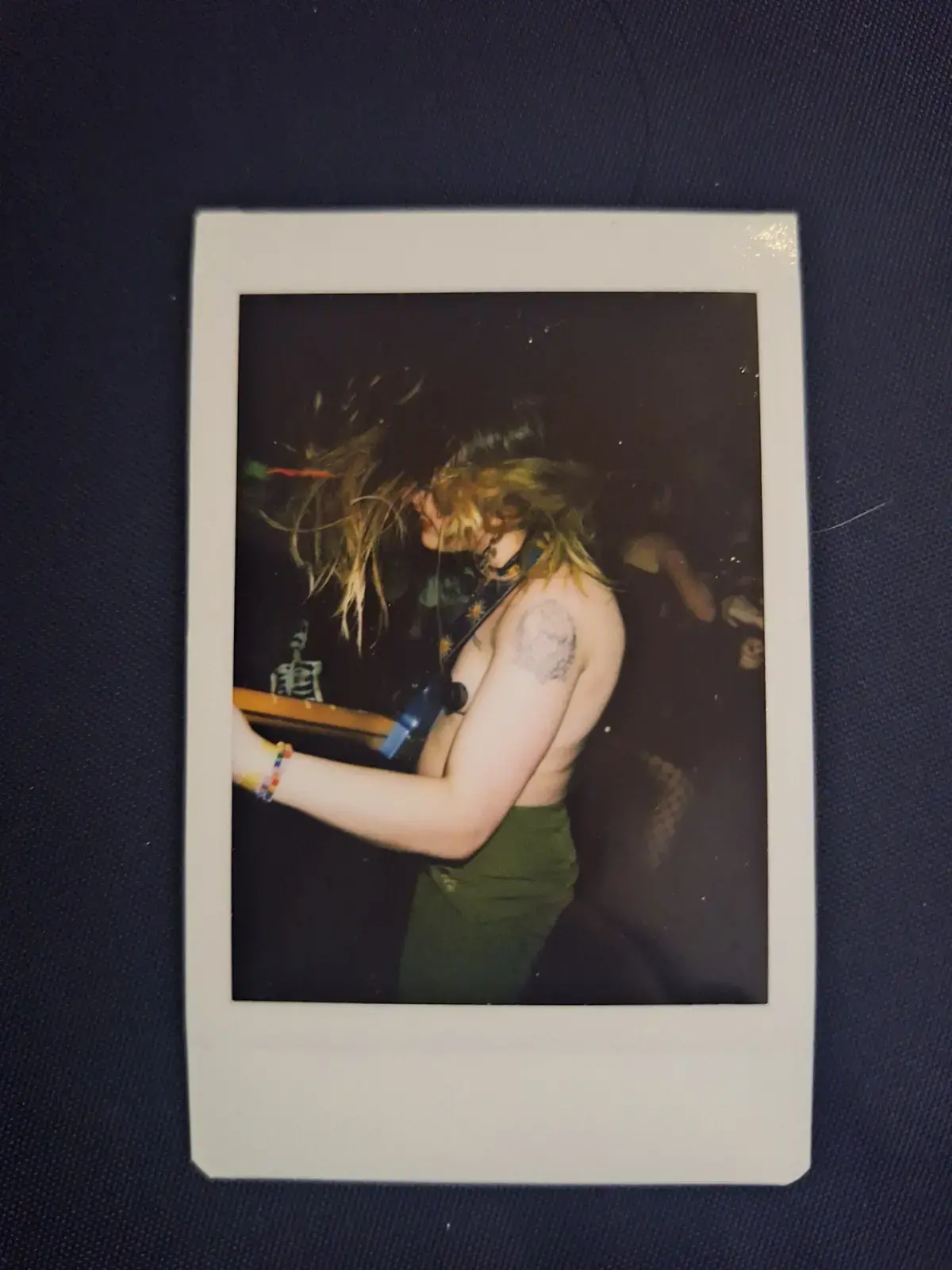
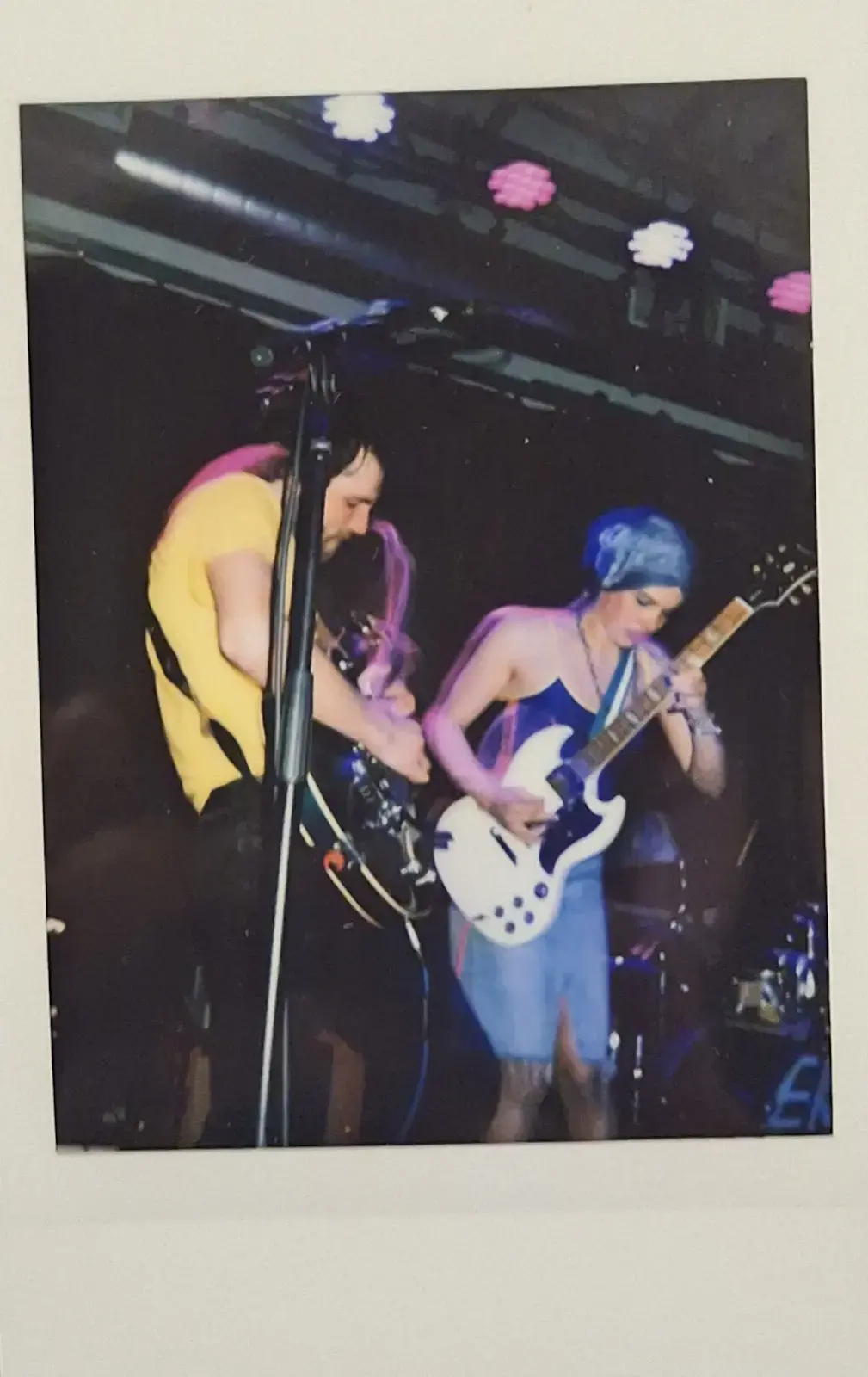
At these shows, the audience has the freedom to be themselves as much as the artists, making the concert experience a mutual agreement of solidarity and euphoria for each participant, onstage and off.
The spaces created by these transcore artists provide more than just entertainment, but a meeting place and outlet, where a decades-long, die-hard punk fan in her 60s can stand next to a boy sketching the singers in the front row. Where a man who trips is immediately assisted by six sets of hands, where the marginalized can thrive.
It’s a rocket-in-a-bottle atmosphere, where the music is loud and the lights are kaleidoscopic, but at the heart of it all is the basic message: Trans or cisgender, you are safe, and you are loved as you are.
“Punk is about being a good person. It’s punk to build a better world,” said Miriam Tyler, nestled in the back seat on the quiet car ride home.
Interested in checking out their music? Here’s a curated playlist to get you started! You can also find each artist on Spotify and Bandcamp, or at their social media handles: @ekkoastral, @crushfund, @xpinkylemonx, @springsilvergram, and @anita.velveeta












